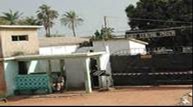By MUHAMMED S. BAH
Mr. Pa Ousman Jarju, Minister of Environment, Climate Change, Water,  Fisheries and Wildlife disclosed that in every national ‘Set Setal’ exercise, his ministry gives the Kanifing Municipal Council D300, 000 while the Council spends over D500, 000, adding that they have also invested in trucks.
Fisheries and Wildlife disclosed that in every national ‘Set Setal’ exercise, his ministry gives the Kanifing Municipal Council D300, 000 while the Council spends over D500, 000, adding that they have also invested in trucks.
The environment minister said this when responding to concerns raised by law makers during the presentation of the report by the National Assembly Select Committee on the Environment which concluded a tour of the coastal and dumping sites from the 22 to 26 June, 2016.
Mr. Jarju told the law makers that this is a national challenge, and has to be looked at holistically.
He described waste management as expensive, noting that councils do not have the financial capacity needed to adequately manage waste.
He, however, commended them for the job they are doing so far, adding “What I know in their budget, the amount of resources dedicated to waste management is almost 60% of their annual budget.”
“As we generate waste, we need to ensure that we own the waste, separate it and if we want a clean environment, then we have to pay for what it takes for an environment to be cleaned,” said the Environment Minister.
Minister Jarju said if they want a proper waste disposal site, where the waste will be separated and segregated, then it means what was studied and investigated about 7 years ago is what they need to do.
“When a study was carried, Tambana was identified as the ultimate waste disposal site. Banjul and Bakoteh were meant to be temporal waste disposal sites where waste could be collected, segregated and finally transferred to Tambana as disposal that was recommended but due to financial difficulties it could not be implemented,” he told the law makers.
The environment minister said what they have encouraged councils to do is to come up with a waste management strategy, noting that they cannot bring the private or public sector resources without a proper plan and strategy.
Minister Jarju said some people pay donkey carts to collect their waste, adding that these people as a result dump waste indiscriminately.
“We need to have a waste management strategy, and KMC has started a study strategy and Banjul also is coming up with a proposal so that they will have an institution that will collect and manage waste, but this comes with a cost, if people are willing to pay beyond what they are paying, if we want the environment to be clean,” he said.
He disclosed that the preparation of the waste management bill is under preparation and it would be presented soon.
This report was laid by Hon. Ousman Bah, NAM for Sabach Sanjal, who is the vice chairman of the Select Committee, and was seconded by Hon. Lamin Jadama, NAM for Niamina West.
In his contribution, Hon. Alhagie Sillah, National Assembly for Banjul North, said there is need for change in the method of dumping waste and for the adoption of international standards of dumping waste so as to eradicate the problem in the country.
“You have clinical waste, domestic waste, commercial, industrial, everything is put together you think that is a proper management. There is no reason why we cannot put a mechanism in place where we can separate waste, each category of waste to be placed aside and probably even recycle it,” he said.
He further cited that there are certain things in the report pointing out that it is the problem of the National Environment Agency.
He said waste management is a problem of the local councils to whom people pay their taxes for their waste to be collected and managed.
He questioned whether the councils are doing their job.
The Banjul North NAM said he has no problems with the councils, but added “we have to make sure that people get their value for money”.
Hon. Sillah said people cannot keep their waste in their compounds for 2 or 3 months, citing an example that his waste was not collected for seven months.
“We have to be realistic and take the bull by the horn, the fact is we are paying monies to the councils and they must render us these services,” he said.
The Banjul North NAM said the Banjul and Bakoteh dumpsites are major hotspots, adding that the biogas of both dumpsites would have been used to supply gas for the entire greater Banjul Area if it is properly managed so that people will do away with charcoal.
Hon. Cherno Jallow, NAM for Upper Nuimi, said there is need to come up with better strategies to address these issues.




















